For aspiring scholars of the Fellow Programme in Management (FPM), choosing a research topic that is not only intellectually stimulating but also relevant to these future trends is paramount. A well-chosen research topic can pave the way for a fulfilling academic career and contribute significantly to the discourse on contemporary management challenges.
Your Roadmap to a High-Impact FPM: Key Research Themes for 2025
The following domains represent the most fertile ground for groundbreaking management research in 2025. Each area is ripe with complex questions and challenges, offering you the opportunity to create knowledge that is both academically rigorous and practically relevant for the leaders of tomorrow.
1. Marketing: Navigating the New Customer-Centric Landscape
The marketing function has been fundamentally transformed by technology. In 2025, the focus will be on leveraging this technology to create hyper-personalised and ethical customer experiences.
A. The AI-Powered Marketer: Personalisation, Prediction, and Privacy
Artificial Intelligence is no longer a futuristic concept in marketing; it is the engine driving it. This opens up a plethora of research avenues.
- Hyper-Personalisation at Scale: How can organisations use AI to deliver individualised marketing messages to millions of consumers without being intrusive? Research could explore the trade-off between personalisation and consumer privacy, the ethical implications of using predictive analytics to target vulnerable customers, and the long-term impact on brand loyalty.
- The Rise of Generative AI in Creative Strategy: The ability of AI to generate text, images, and video is a game-changer for content marketing. FPM scholars can investigate the effectiveness of AI-generated content versus human-created content, the potential for AI to democratise creativity in marketing, and the challenges of maintaining brand authenticity with automated content creation.
- Predictive Analytics for Customer Lifetime Value (CLV): How accurately can we predict the future value of a customer? Research in this area could focus on developing more sophisticated CLV models using machine learning, understanding the drivers of high CLV in different industries, and exploring how these predictions can inform strategic marketing decisions.
B. Sustainability as a Core Marketing Proposition
Modern consumers, particularly the younger demographic, are increasingly making purchasing decisions based on a brand’s environmental and social credentials.
- The “Say-Do” Gap in Green Consumption: Why do consumers say they value sustainability but often don’t purchase sustainable products? Research can explore the psychological barriers to green consumption, the role of marketing in bridging this gap, and the effectiveness of different communication strategies in promoting sustainable behaviours.
- Circular Economy and Marketing’s Role: The shift from a linear “take-make-dispose” model to a circular one presents a significant opportunity for marketers. FPM topics could include developing marketing strategies for refurbished or upcycled products, understanding consumer acceptance of product-as-a-service models, and exploring how marketing can educate and encourage participation in circular systems.
2. Finance: Fintech, Sustainability, and New Frontiers of Value
The financial landscape is being reshaped by technology and a growing demand for responsible investing. FPM research in finance in 2025 will be at the intersection of these powerful forces.
A. The FinTech Revolution Continues
The synergy between finance and technology continues to spawn innovation and disruption.
- Decentralised Finance (DeFi) and its Implications: DeFi has the potential to create a more open and accessible financial system. Research in this area could examine the risks and opportunities of DeFi, its potential impact on traditional financial intermediaries, and the regulatory challenges it poses.
- AI and Algorithmic Trading: The use of AI in financial markets is becoming increasingly sophisticated. FPM scholars could investigate the impact of high-frequency trading on market stability, the potential for AI to create new forms of systemic risk, and the ethical considerations of using AI to make investment decisions.
- Cybersecurity in the Financial Sector: As financial services become more digitised, the threat of cyberattacks grows. Research could focus on developing more robust cybersecurity frameworks for financial institutions, understanding the economic impact of cyber breaches, and exploring the role of regulation in enhancing cybersecurity.
B. The Rise of Sustainable Finance
Environmental, Social, and Governance (ESG) criteria are no longer a niche concern; they are a core component of investment decision-making.
- The Financial Performance of ESG Investing: Does investing in companies with strong ESG performance lead to better financial returns? This is a critical question for investors, and FPM research can contribute by conducting rigorous empirical studies across different markets and time periods.
- Climate Finance and Risk Management: How can the financial sector help to mitigate and adapt to climate change? Research topics could include the development of new financial instruments to fund climate projects, the pricing of climate risk in financial assets, and the role of central banks in addressing climate-related financial risks.
3. Human Resource Management: The Evolving World of Work
The COVID-19 pandemic accelerated profound changes in how we work. FPM research in HRM in 2025 will grapple with the challenges and opportunities of this new era.
A. Managing in a Hybrid and Remote World
The shift to remote and hybrid work models is here to stay, presenting new challenges for managing people and culture.
- Maintaining Organisational Culture in a Distributed Workforce: How can organisations build and sustain a strong culture when employees are not physically co-located? Research could explore the role of technology in fostering connection, the importance of leadership in a hybrid environment, and the impact of different hybrid models on employee engagement and innovation.
- Performance Management in the Age of Remote Work: Traditional performance management systems are often ill-suited to remote work. FPM scholars can investigate the effectiveness of outcome-based performance metrics, the role of regular check-ins and feedback, and the challenges of ensuring fairness and equity in performance evaluations.
- Employee Well-being and Mental Health: The blurring of lines between work and home life has brought employee well-being to the forefront. Research in this area could explore the drivers of burnout in remote workers, the effectiveness of different well-being interventions, and the role of organisations in promoting a healthy work-life integration.
B. The Impact of AI on HR
AI is transforming every aspect of the HR function, from recruitment to employee engagement.
- Algorithmic Bias in Recruitment: How can we ensure that the AI algorithms used in recruitment are fair and do not perpetuate existing biases? FPM research can play a crucial role in developing methods for auditing and mitigating bias in AI-powered hiring tools.
- AI for Employee Skill Development: AI can be used to create personalised learning and development paths for employees. Research could explore the effectiveness of AI-powered coaching and mentoring platforms, and how AI can help to identify and close skills gaps within an organisation.
4. Operations & Supply Chain Management: Building Resilience and Intelligence
Recent global disruptions have highlighted the fragility of global supply chains. The focus in 2025 will be on building more resilient, agile, and sustainable supply chains.
A. Supply Chain Resilience in a Volatile World
The ability to withstand and recover from disruptions is now a key competitive advantage.
- The Trade-off between Efficiency and Resilience: For decades, supply chains were optimised for efficiency. Now, the focus is shifting to resilience. FPM scholars can investigate the optimal balance between these two competing objectives and develop frameworks for designing resilient supply chains.
- The Role of Digital Twins in Supply Chain Risk Management: A digital twin is a virtual replica of a physical supply chain. Research could explore how digital twins can be used to simulate different disruption scenarios, identify vulnerabilities, and develop proactive risk mitigation strategies.
B. The Intelligent Supply Chain
The integration of technologies like IoT, blockchain, and AI is creating a new generation of intelligent supply chains.
- The Internet of Things (IoT) for Real-Time Visibility: IoT sensors can provide real-time data on the location and condition of goods as they move through the supply chain. Research could explore how this data can be used to improve forecasting, reduce waste, and enhance customer service.
- Blockchain for Transparency and Traceability: Blockchain technology can create a secure and transparent record of all transactions in a supply chain. FPM topics could include the application of blockchain for ensuring food safety, combating counterfeiting, and promoting ethical sourcing.
5. Strategic Management: Thriving in an Era of Uncertainty
In a world characterised by rapid change and uncertainty, the ability to adapt and innovate is crucial for long-term success.
A. Dynamic Capabilities and Strategic Agility
Dynamic capabilities are the firm’s ability to integrate, build, and reconfigure internal and external competences to address rapidly changing environments.
- Developing Dynamic Capabilities in the Digital Age: How can organisations develop the dynamic capabilities needed to thrive in the digital economy? Research could explore the role of leadership, organisational culture, and strategic alliances in fostering agility and innovation.
- Strategic Decision-Making Under Uncertainty: Traditional strategic planning models are often inadequate in today’s volatile environment. FPM scholars can investigate the use of scenario planning, real options analysis, and other tools for making robust strategic decisions in the face of uncertainty.
B. Business Models for the Digital and Sustainable Economy
The transition to a digital and sustainable economy is creating a demand for new and innovative business models.
- Platform-Based Business Models: Platform companies have come to dominate many industries. Research could explore the competitive dynamics of platform markets, the challenges of governing platform ecosystems, and the societal implications of their growing power.
- Circular Business Models: As discussed in the marketing section, the circular economy is a major strategic opportunity. FPM research in strategy could focus on how companies can transition to circular business models, the challenges of creating closed-loop supply chains, and the financial and competitive benefits of circularity.
6. Information Technology & Business Analytics: The Ethical Frontier of Data
The power of data is undeniable, but with it comes great responsibility. FPM research in this area will focus on the ethical and responsible use of data and AI.
A. The Ethics of AI and Algorithmic Decision-Making
As AI systems become more autonomous, the ethical implications of their decisions become more profound.
- Algorithmic Fairness and Bias: How can we ensure that the algorithms used in areas like credit scoring, criminal justice, and healthcare are fair and do not discriminate against certain groups? This is a critical area for interdisciplinary research, combining computer science, ethics, and social science.
- Explainable AI (XAI): Many AI models are “black boxes,” making it difficult to understand how they arrive at their decisions. Research in XAI aims to develop methods for making AI systems more transparent and accountable.
B. The Governance of Data
Data is one of the most valuable assets of any organisation, and it needs to be managed and governed effectively.
- Data Privacy and Security in the Age of Big Data: How can organisations collect and use large amounts of data while protecting the privacy and security of individuals? Research could explore the effectiveness of different privacy-enhancing technologies and the role of regulation in protecting data.
- Data Monetisation Strategies: How can organisations create value from their data assets in an ethical and responsible manner? FPM scholars can investigate different data monetisation models and the challenges of building a data-driven culture.
7. Entrepreneurship: New Ventures in a Changing World
The entrepreneurial landscape is constantly evolving, with new opportunities emerging from technological and societal shifts.
A. The Gig Economy and Platform-Based Entrepreneurship
The rise of platforms like Uber, Airbnb, and Upwork has created new opportunities for entrepreneurship.
- The Future of Work in the Gig Economy: What are the long-term implications of the gig economy for workers, businesses, and society? Research could explore issues of job security, income inequality, and the need for new social safety nets.
- Success Factors for Platform-Based Ventures: What makes a platform-based business successful? FPM research can investigate the critical success factors, such as network effects, trust-building mechanisms, and governance models.
B. Social and Sustainable Entrepreneurship
A growing number of entrepreneurs are focused on creating businesses that have a positive social or environmental impact.
- Measuring the Impact of Social Ventures: How can we measure the social and environmental impact of these ventures in a credible and consistent way? This is a key challenge for the field of social entrepreneurship.
- Financing Social and Sustainable Enterprises: What are the most effective ways to finance businesses that prioritise purpose over profit? Research could explore the role of impact investing, blended finance, and other innovative financing models.
From Confusion to Clarity: Choosing the Right FPM Research Topic
Selecting a research topic is arguably the most critical decision in your doctoral journey. A great topic can fuel your motivation for years, while a poorly chosen one can become a significant hurdle. Here’s a practical guide to making the right choice.
1. Align with Your Passion and Curiosity
The FPM is a marathon, not a sprint. You will spend thousands of hours reading, writing, and thinking about your chosen topic. It is essential that the subject genuinely fascinates you. What business problems keep you up at night? What trends in the industry do you find most compelling? Your innate curiosity will be the fuel that sustains you through the inevitable challenges of doctoral research.
2. Review Existing Literature to Find the Gap
A core objective of FPM research is to contribute new knowledge to the field. To do this, you must first understand the existing conversation. Conduct a preliminary literature review to see what has already been studied. Look for the “gap”, what questions remain unanswered? Where are the debates or contradictions in current research? Your study should aim to address such a gap, extending, challenging, or refining existing theories.
3. Assess the Feasibility and Data Availability
A brilliant research idea is useless if it cannot be executed. Be realistic about the resources you have. Is there accessible data for your topic? If you need to collect primary data through surveys or interviews, do you have a feasible plan to reach your target population? Consider the timeline of your FPM program and ensure your research scope is manageable within that period.
4. Consult with Faculty and Mentors
Leverage the expertise around you. Discuss your ideas with faculty members at FIIB, especially those whose research interests align with yours. They can provide invaluable feedback, help you refine your research questions, and alert you to potential pitfalls. A good mentor can guide you toward a topic that is not only interesting but also has a high potential for academic impact.
5. Consider Future Career Trajectories
Think about your long-term goals. Do you want to pursue a career in academia, policy-making, or industry research? Your FPM dissertation will become your calling card, establishing you as an expert in a specific niche. Choose a topic that aligns with the career path you envision for yourself after graduation. Researching a cutting-edge, relevant topic will make you a more attractive candidate for future opportunities.
FIIB’s Fellow Program in Management (FPM)
FIIB’s Fellow Program in Management (FPM) is a full-time, AICTE-approved doctoral program designed to develop future-ready scholars, educators, and thought leaders in management. Anchored in a robust and globally connected research ecosystem, the program blends academic rigor with real-world relevance. With 30+ international research collaborations and a strong in-house publication culture—led by the FIIB Business Review (FBR), a Scopus-indexed, ABDC, UGC-CARE, and ABS-listed journal—FIIB offers doctoral scholars unmatched opportunities to publish, collaborate, and contribute meaningfully to the evolving landscape of business knowledge.
Why Choose FPM at FIIB?
- AICTE-approved full-time doctoral program in core areas of management
- Designed for aspiring academicians, researchers, and industry thought leaders
- Emphasis on research excellence, publication impact, and global exposure
- Backed by 30+ international research partnerships across universities and institutions
- Home to FIIB Business Review (FBR) – Scopus-indexed and listed in ABDC, UGC-CARE, and ABS
- Covers domains like Strategy, OB/HR, Marketing, Finance, Operations, and Economics
- Offers personalized mentoring and structured coursework from experienced faculty
- Stipend support up to ₹50,000/month for eligible full-time scholars
- Opportunities for conference participation, publishing, and interdisciplinary research
- Access to faculty development, research circles, and innovation-led academic platforms
- Pathways to careers in academia, consulting, think tanks, and policy research
Ready to Apply?
Start your application today and begin your journey toward academic distinction and leadership excellence.

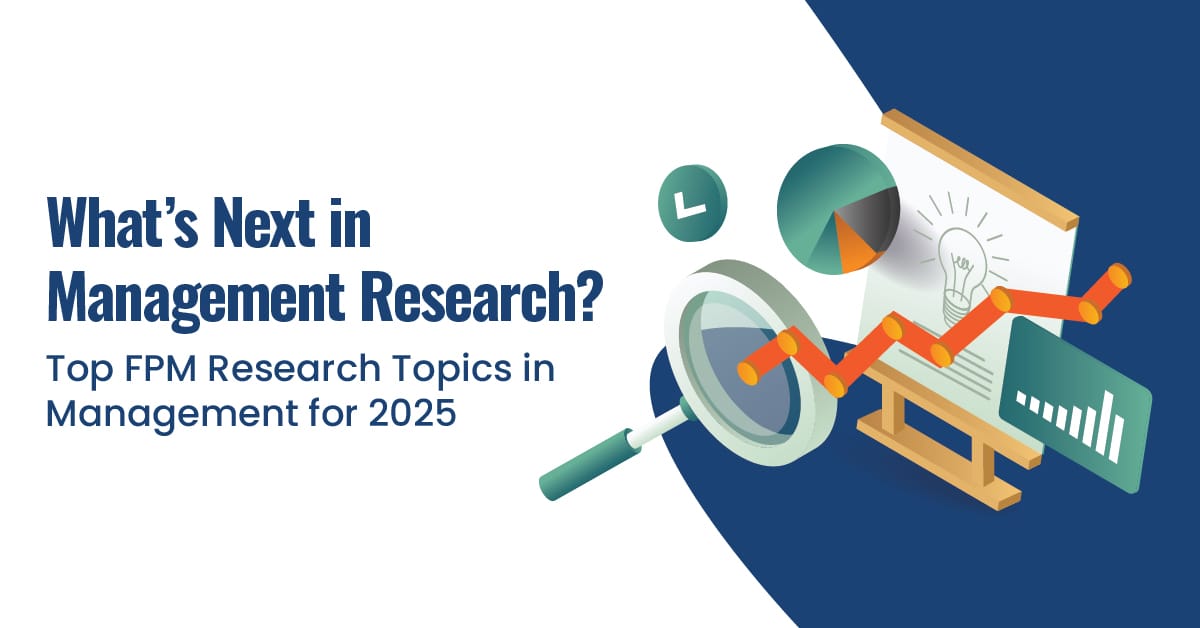


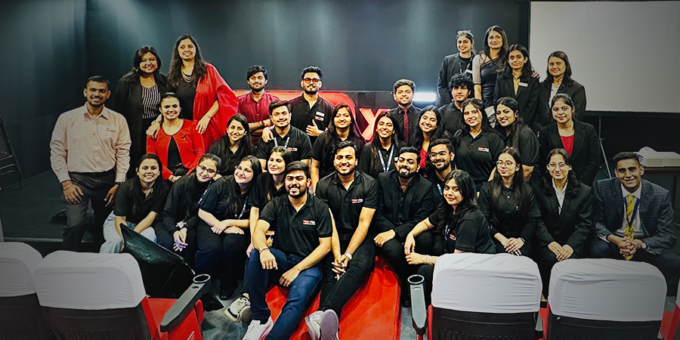



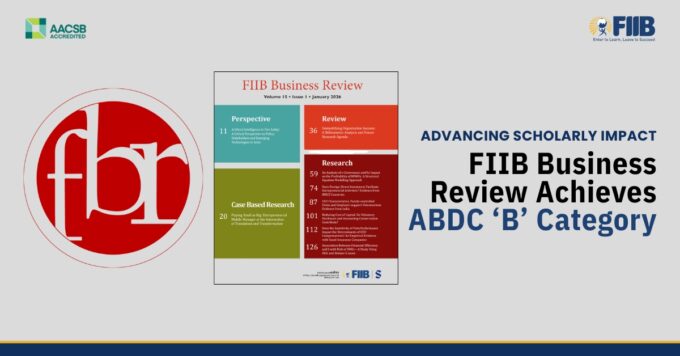
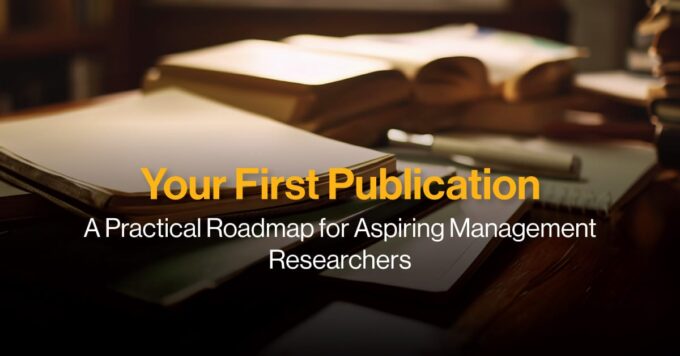



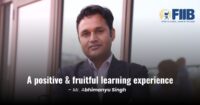


Leave a comment